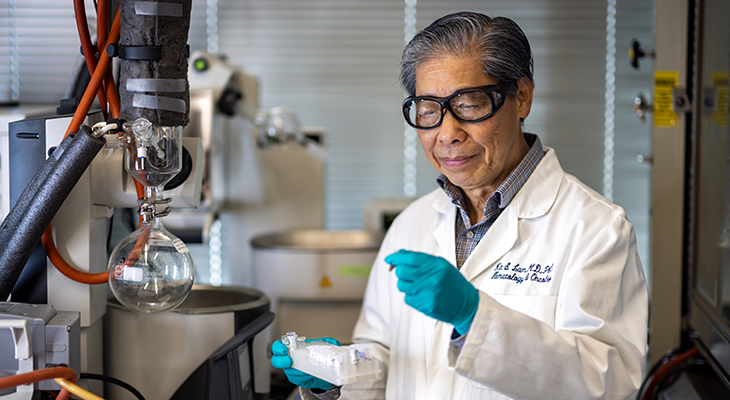Imagine a targeted approach to bladder cancer that spares healthy cells while delivering chemotherapy directly to cancerous ones, offering hope for patients with advanced stages of the disease.
For Sacramento resident Gerald Hecoxz, that has become a reality.

Hecox recently completed a life-changing clinical trial of a new drug delivery system called PLZ4-coated paclitaxel-loaded micelles (PPM). UC Davis and the U.S. Department of Veterans Affairs funded the pre-clinical work required to get PPM approved for clinical trials in humans.
So far, three out of four patients have complete remission of their tumors at the first-dose level of the trial.
The breakthrough demonstrates the critical importance of continued federal funding of cancer research.
The drug was developed at UC Davis by Kit S. Lam, a distinguished professor in the School of Medicine's Department of Biochemistry and Molecular Medicine and Division of Hematology and Oncology, and Chong-xian Pan, an associate professor of medicine who is now at Brigham and Women's Hospital in Boston. Pan is a former professor of medicine and urology at UC Davis Health.
"I'd been treated three times before, but the cancer kept coming back," Hecox said. "My doctor referred me to UC Davis to have my bladder removed. I wasn't going to do that without putting up a fight."
When Hecox found out he was eligible for the PPM trial, he signed up immediately. Just six weeks after starting treatment in July 2025, his scans showed no sign of bladder cancer. At 74, he's now back to golfing and hanging out with his family's three corgis: Molly, Walter and Callie. He's even planning a camping trip with his wife, Judy.
Hecox is one of four people who have received the novel therapy, including three patients at the VA Boston Healthcare System. UC Davis Health is currently enrolling more patients to test how recurring non-invasive bladder cancer responds to the new therapy.
"Mr. Hecox is a great example of a patient who could benefit from our treatment," said Mamta Parikh, an associate professor of hematology and oncology. Parikh is a bladder cancer researcher and the trial's principal investigator. "The next step for his bladder cancer would have required extensive surgery. As a very active person, he was looking for an alternative, and he's done quite well in the study."
Bladder cancer and its recurrence
Hecox was diagnosed with non-muscle invasive bladder cancer, the most common form of the disease. It grows within the bladder lining, called the urothelium. For about 50 years, oncologists have relied on surgical removal of visible tumors followed by an immunotherapy treatment called Bacillus Calmette-Guerin.
Clinicians deliver BCG via a catheter to a patient's bladder, exposing the entire urothelium to the substance. Once in the bladder, the drug activates a local immune response to attack cancer cells. It can also trigger side effects such as flu-like symptoms, fatigue and painful urination, since treatment isn't confined to the tumor.
While BCG can be an effective treatment for bladder cancer that hasn't metastasized, Lam and his colleagues noted that around 75% of cancers treated with BCG recur, as Hecox's did. When treatment fails, the only option left for many patients is complete bladder removal, also called a cystectomy.
Bladder removal requires lengthy anesthesia, which can be risky for patients. Cystectomy patients must either wear a bag on the outside of their bodies to drain their urine or receive a new bladder constructed from intestinal tissue.
"Radical cystectomy is a major surgery, and although patients can live healthy lives afterwards, it does impact their quality of life," Parikh said. "Mr. Hecox is an active person who wants to remain that way and he came to us looking for an alternative."

Delivering chemotherapy while reducing side effects
Lam's new treatment, PPM, takes a different approach to cancer treatment.
PPM is made of lipid-polymer hybrid molecules that self-assemble to form tiny spherical nanoparticles called micelles that can carry other substances. In this case, micelles encapsulate the chemotherapy drug paclitaxel, which is used to treat a variety of cancers, including bladder, breast, and non-small cell lung cancer.
PPM is coated with the molecule PLZ4 that binds to receptors on the surface of bladder cancer cells. The nanoparticles are then taken up by the cancer cells, where paclitaxel is released to prevent cancer growth.
"With treatments that don't take a targeted approach, there's always the concern that not enough drugs will be delivered to the cancer cells," Parikh said. "Our hope is that this treatment might be more effective since it does target the cancer."
As Parikh noted, when healthy cells are exposed to standard paclitaxel, the drug can cause significant irritation to bladder tissue and difficulties with urination. However, Hecox reported no side effects during the trial. This is because PPM targets only cancer cells, not normal bladder tissue.
Clinicians administered PPM to Hecox's bladder through a catheter once a week for six weeks. He was monitored regularly by having his bladder lining examined through a camera inserted into the bladder in addition to blood tests and CT scans. He'll continue to be tested in the months to come, but so far, his examinations have shown no signs of cancerous cells.
Hecox's wife, Judy, explained that they both were scared about their lack of options before he entered the trial. They felt other doctors had given up on him, and neither of them wanted his bladder to be removed.
"We've been immensely impressed with UC Davis," she said. "Everyone is so thoughtful and nice. They let us know exactly what to expect every step of the way. We're very pleased with the treatment we got and he's going to stay with his doctors at Davis."
Parikh and the rest of the research team will continue to recruit patients to measure PPM's safety and effectiveness. Patients can talk to their primary doctor about obtaining a referral to the Urologic Oncology clinic to discuss participation in the trial.
"This is an innovative treatment that could provide an alternative to major surgery for patients with non-muscle invasive bladder cancer and potentially prevent them from losing their bladders," Parikh said. "It offers hope for people who have tried BCG and had their cancers come back."






